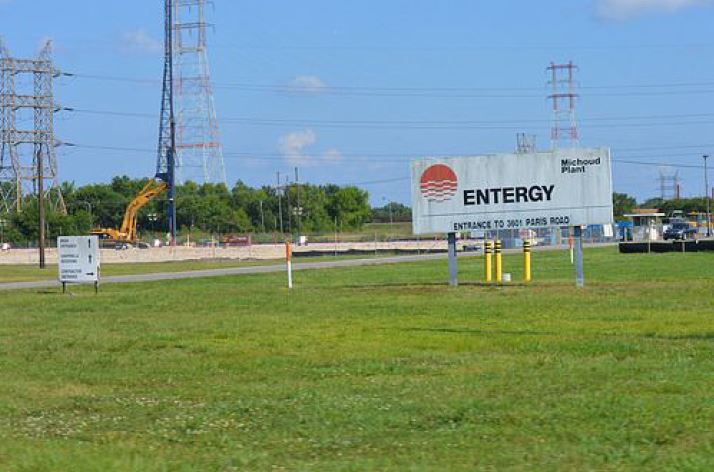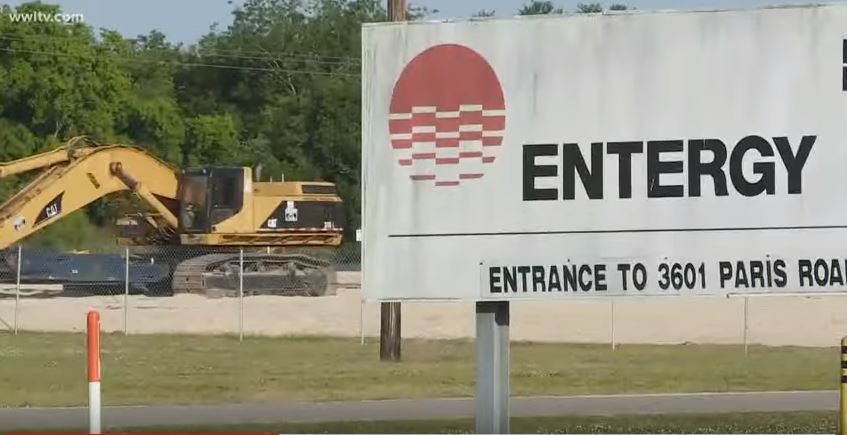Records released by Entergy New Orleans reveal company officials worked closely with an energy industry public relations firm on developing strategies for getting the New Orleans City Council to believe that a broad segment of the city’s population supported a proposed natural gas-fired power plant.
Entergy turned over a trove of documents to the New Orleans City Council last Friday as part of the council’s formal investigation into a campaign to pay actors to show up at meetings to support’s the proposed power plant.
The 6,000 pages of documents, released to the public on Wednesday, show that the Hawthorn Group, a Virginia-based public relations firm, sent Entergy a list of its services and how much it would cost to recruit supporters and speakers. The Hawthorn Group has a history of using “astroturf” operations in attempts to manufacture the appearance of popular support for a utility company’s position where none or little exists.
Entergy’s decision to hire a public relations firm to influence policymakers is not unique among large corporations. Paying real people to attend meetings, protests, and campaign events or appear in advertisements remains a go-to practice for energy companies. Known as astroturfing, this is the longtime corporate practice of funding initiatives that mimic grassroots support for an issue.
In January, the Hawthorn Group provided Entergy with a list of five options: 15 supporters at hearings with hand-made signs at a price of $6,125; 20 supporters at a price of $7,725; 30 supporters at a price of $10,700; 10 speakers at a price of $6,700; or five speakers at a price of $4,600.
According to the documents, Entergy decided to pay the Hawthorn Group for 30 supporters. In an email included in the document batch released to the city council, an Entergy communications officials referred to having the payment approved with “Charles,” or Charles Rice, the CEO of Entergy New Orleans.
Two invoices sent to Entergy prior to public meetings on the proposed power plant show the Hawthorn Group billed Entergy for at least $54,600 in services for its work on demonstrating support at public meetings, including paying for actors.
The New Orleans City Council approved the power plant on March 8 in a 6-1 vote. New Orleans has an unusual setup where the city council, not a separate utilities commission, has regulatory authority over the city’s electric utility.
Last month, the New Orleans City Council voted to open a formal investigation after The Lens, a nonprofit news outlet based in New Orleans, reported that dozens of people, including actors, were paid to attend public meetings and deliver pre-written speeches in favor of the power plant in eastern New Orleans.
Even though investigations have revealed participants were paid to show support for the power plant, Entergy New Orleans maintains it had no knowledge that individuals were paid to specifically attend or speak at city council meetings.
The Hawthorn Group hired Crowds on Demand, a Los Angeles-based company that pays people to show up at events such as protests and government meetings. Participants were paid $60 each to attend each public meeting about Entergy New Orleans proposed natural gas power plant in an area of the city called East New Orleans. Those with “speaking roles” — going to a podium and speaking in favor of the power plant — were paid $200.
The Hawthorn Group told ThinkProgress that “paying participants was not requested or authorized by our client or by Hawthorn. Clearly, there was a misunderstanding, which we deeply regret.”
Last summer, when the New Orleans City Council opened a proceeding to look at the reliability of Entergy’s electric power system in the city, the company grew concerned when a large number of neighborhood associations, many of them opposed to the power plant, joined the proceeding as intervenors.
In an email included in the batch of documents, Entergy CEO Charles Rice expressed concern about the docket and told his management team that they needed to develop a strategy and campaign against the Alliance for Affordable Energy, a New Orleans-based nonprofit group that had organized residents to participate in the regulatory process.
Logan Atkinson-Burke, executive director of the alliance, told ThinkProgress that she found Rice’s email extremely troubling.
“Entergy’s response to people having access to information was to launch a campaign and strategy against such a thing,” Atkinson-Burke said Friday in an interview. “That is a problem in a city where transparency has historically been a problem.”
Entergy had not responded to a request for comment from ThinkProgress at the time this article was published.
Entergy filed its application in 2016 seeking approval for the new power plant. The proposed site is located in New Orleans East, an area made up of predominantly Vietnamese, African American, and Latino communities. The $210 million plant, slated for construction in an area of New Orleans that the Federal Emergency Management Agency has designated as a flood zone, has been the target of strong opposition since Entergy filed its application.
The proposed plant will have estimated emissions of 358,561 tons of greenhouse gases every year for its 30-year lifespan.
In case you missed some of the latest news. Also, hang on.. there were 6000 pages of documents. We’re just getting started. https://t.co/QZMu39fJKB pic.twitter.com/LUbzsD9h5N
— Alliance 4 Affordable Energy (@All4Energy) June 14, 2018
After the city council’s vote in favor of the power plant in March, local groups filed lawsuits, asking the courts to reverse the decision and hold a new hearing that takes into consideration viable clean energy alternatives to the plant. Another lawsuit accused the city council of violations of the Louisiana Constitution and the open meetings law, both of which require state and local governments maintain open and transparent processes.
Community members, for example, were also blocked from attending the city council meeting that gave the project final approval on March 8.
Atkinson-Burke said construction has already begun on the 128-megawatt power plant, even though Entergy has yet to receive its air permits from the Louisiana Department of Environmental Quality. The only condition that the city council placed on its approval of the power plant was that Entergy wait to receive its air permits before starting construction.

“Unfortunately, the city council is not saying Entergy can’t move forward. They aren’t suspending their decision,” Atkinson-Burke said. “They’re saying they’re disappointed. But they are not responding to the community.”
Speaking to the effectiveness of the corporate practice of astroturfing, Atkinson-Burke said she believes the city council was influenced by the number of people who showed up at public meetings in support of the power plant project. At a February public meeting, Entergy alerted plant supporters to fill the room early to prevent the opposition from dominating the discussion, according to one of the emails.
The new documents also revealed that Entergy and the Hawthorn Group discussed whether both union members and actors should wear orange t-shirts to the city council hearing in October 2017. The shirts read: “Clean Energy. Good jobs. Reliable power.”
Entergy communications manager Yolanda Pollard asked Hawthorn Group President Suzanne Hammelman: “What’s your take on union leaders also wearing orange tshirts, similar to attendees you’re securing?” The attendees being secured by The Hawthorn Group were actors recruited to show support for the power plant.
The president of the public relations firm responded: “I actually think it would be good if we can get others to wear shirts. That will lessen the questions about ‘who are these people.’”
The documents also show Pollard scrambling upon receiving a question from a reporter during the week of the city council vote about “someone being paid ‘$120 as an actor to speak on behalf of Entergy.'”
Hammelman wrote back to Pollard to say the reporter, someone from DeSmog, was “dilusional [sic] or just lying.” And as The Times-Picayune reported Thursday, earlier emails show that Entergy and Hammelman had developed talking points to address questions about paid actors.



